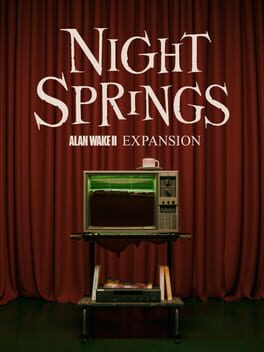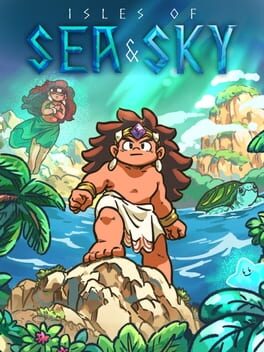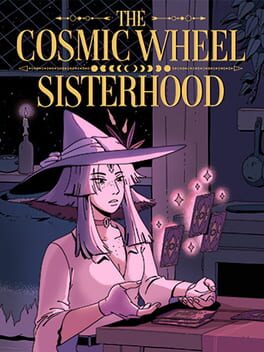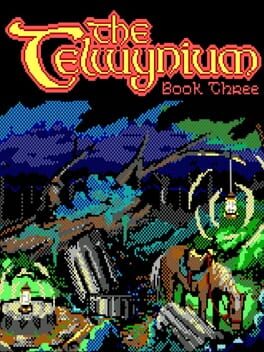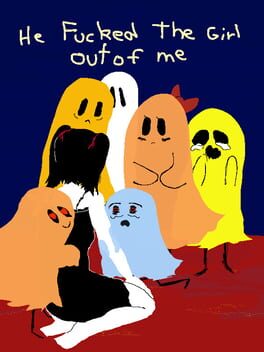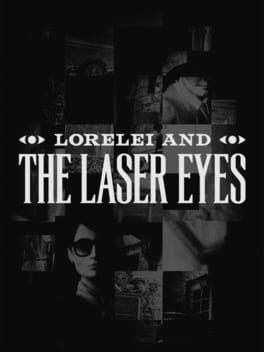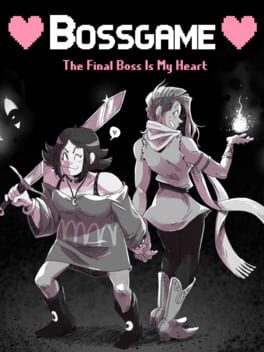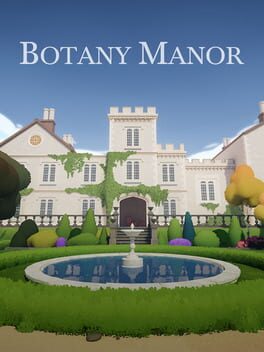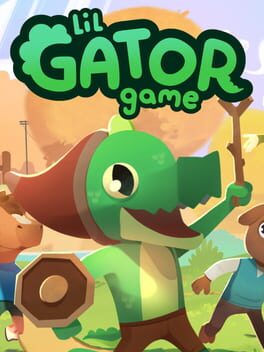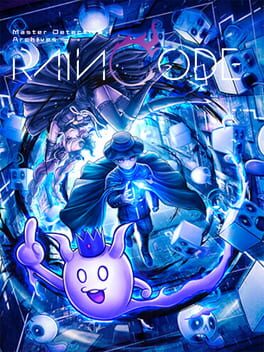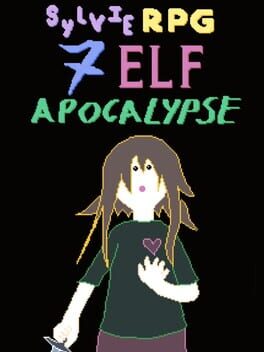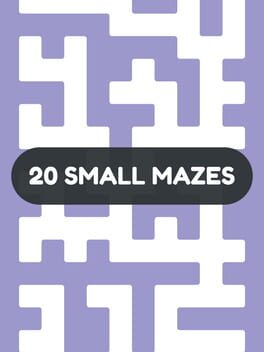lukebee
The first of Alan Wake II’s two planned DLC expansions, this one consisting of three episodes which each present a different AU/what-if scenario starring an alternate version of some Remedyverse character: Alan Wake waitress and Wake superfan Rose Marigold, Control protagonist and FBC director Jesse Faden, and Alan Wake II sheriff and Quantum Break expy Tim Breaker. I was hoping for some connective tissue between episodes or to the main game (maybe something with Wake and Door creating the episodes together?), but alas these are instead entirely non-canon stories that are also completely separate from each other. They also don’t really feel like Night Springs episodes—which is to say, Twilight Zone episodes—outside of David Harewood’s Warlin Door channeling his inner Rod Serling at the beginning and end of each episode. All that being said, taken on their own merits these episodes were a lot of fun. Being able to absolutely mow down enemies thanks to the metric truckload of ammunition and ridiculous weapons like Rose’s fully automatic shotgun that the DLC throws at you was a welcome change of pace, and each episode fully embraces the weird and absurd.
Rose’s episode is easily the goofiest of the lot, a parodic self-insert fanfic story where everyone fawns over her and her Wake fan site and she does battle with legions of “haters” led by Wake’s sexy motorcycle-riding werewolf bad boy twin (the reveal that his motorcycle is also a werewolf absolutely killed me). It completely defies belief that it’s something Wake would have written, but it’s also so funny that I can forgive them playing fast and loose with the conceit.
By contrast, Jesse’s episode is almost disappointingly normal; sure, there are killer coffee thermos mascots but that barely even registers compared to the other two episodes. It was nice to see Jesse again but it’s easily the weakest of the three episodes.
And finally, there’s Tim’s episode, my favorite of the bunch. I know I called Rose’s episode “fanfic” earlier, but Tim’s episode genuinely reads like Remedy’s unlicensed (Microsoft owns the rights to the IP) and extremely meta attempt at a Quantum Break follow-up, wherein the lead actor for the Sam Lake-directed FMV-heavy video game “Time Breaker” finds himself thrust into the game’s very real multiversal conflict with Mr. Door (who of course is himself the Remedyverse version of Quantum Break’s Martin Hatch). Sam Lake is clearly still having the time of his life in his brief motion-capture appearance as himself, there’s some fun new flavors of cross-media fuckery; the whole thing is a blast. It’s also just kind of fascinating as an exercise in blatantly side-stepping IP law, I felt like I was watching Remedy’s getting away with something. Would have loved to see some actual FMV alongside the other shifts in medium though, and given that they actually invoke Door by name (most of the “Night Springs” characters are unnamed versions of themselves; e.g. Tim Breaker here is simply “The Actor”) I was honestly surprised that Door’s presence as the host of the “show” didn’t get incorporated into the plot in some way, either by having Door break the fourth wall or by having Tim’s multiverse travel break him out of the TV show framing device entirely and take him into the main Remedyverse. Again, strictly non-canon though, so no dice.
Anyways, I’m hoping “The Lake House” will satisfy my hunger for some actual new plot or character developments building off of the main game, but “Night Springs” was a weird and delightful experience and I really enjoyed my time with it.
Rose’s episode is easily the goofiest of the lot, a parodic self-insert fanfic story where everyone fawns over her and her Wake fan site and she does battle with legions of “haters” led by Wake’s sexy motorcycle-riding werewolf bad boy twin (the reveal that his motorcycle is also a werewolf absolutely killed me). It completely defies belief that it’s something Wake would have written, but it’s also so funny that I can forgive them playing fast and loose with the conceit.
By contrast, Jesse’s episode is almost disappointingly normal; sure, there are killer coffee thermos mascots but that barely even registers compared to the other two episodes. It was nice to see Jesse again but it’s easily the weakest of the three episodes.
And finally, there’s Tim’s episode, my favorite of the bunch. I know I called Rose’s episode “fanfic” earlier, but Tim’s episode genuinely reads like Remedy’s unlicensed (Microsoft owns the rights to the IP) and extremely meta attempt at a Quantum Break follow-up, wherein the lead actor for the Sam Lake-directed FMV-heavy video game “Time Breaker” finds himself thrust into the game’s very real multiversal conflict with Mr. Door (who of course is himself the Remedyverse version of Quantum Break’s Martin Hatch). Sam Lake is clearly still having the time of his life in his brief motion-capture appearance as himself, there’s some fun new flavors of cross-media fuckery; the whole thing is a blast. It’s also just kind of fascinating as an exercise in blatantly side-stepping IP law, I felt like I was watching Remedy’s getting away with something. Would have loved to see some actual FMV alongside the other shifts in medium though, and given that they actually invoke Door by name (most of the “Night Springs” characters are unnamed versions of themselves; e.g. Tim Breaker here is simply “The Actor”) I was honestly surprised that Door’s presence as the host of the “show” didn’t get incorporated into the plot in some way, either by having Door break the fourth wall or by having Tim’s multiverse travel break him out of the TV show framing device entirely and take him into the main Remedyverse. Again, strictly non-canon though, so no dice.
Anyways, I’m hoping “The Lake House” will satisfy my hunger for some actual new plot or character developments building off of the main game, but “Night Springs” was a weird and delightful experience and I really enjoyed my time with it.
2024
A really neat game that combines sokoban puzzles with Zelda-style exploration and secrets and unlockable abilities. Had a great time playing this with my brother, the puzzles are pretty clever and there’s lots of really fun mechanics to play with. My only real complaint is that the game doesn’t do a great job signposting if you have the necessary abilities/unlocks for a puzzle to be solvable, and even worse, there are several extremely conspicuous places that I wasted a bunch of time looking for secrets in only to look it up and find out there’s nothing there… yet. Turns out they’re related to some planned future content for the game, but for the moment they’re just annoying red herrings that occasionally get in the way of the otherwise very enjoyable secret-hunting.
A visual novel about an exiled fortune-telling space witch that I wanted to like more than I actually did. I really loved the art and character designs and there's lots of interesting decisions to make, but the game just didn't grab at me that deeply. The card-building mechanic was kinda fun the first couple times but the game doesn't really provide much reason to keep engaging with it, especially since the relationship between the cards and the choices they make available to you is so vague. The act of actually performing divinations with the cards was more engaging, but at the halfway mark they get kinda sidelined for some new mechanics and story beats that were much less interesting to me, there was a lot of picking the same few options over and over just to advance the story. I'm also not a fan of the gender-essentialist world-building decision that men can't be witches. Like, it's cool that there are trans witches, and there's a throwaway "women and non-binary people" line, but it still feels extremely arbitrary (and downright silly considering the existence of alien witches and a witch who's literally a tree) and the fact that the protagonist has the option of saying that it's kinda bullshit doesn't make it any less bullshit. If they wanted to make a game exclusively about cool witchy women/femmes then fine, but I think I would've preferred it if they just literally never acknowledged the lack of men rather than opening that particular can of worms.
A short, semi-autobiographical game about its author's experiences with being poor and transgender and doing sex work and the lasting trauma that came from that. Reminded me a bit of Nathalie Lawhead's work, albeit without any of the black humor to blunt the nausea and discomfort from what's being conveyed.
2024
A gorgeous Metroidvania game that's absolutely jam-packed with FEZ/TUNIC-style secrets.
2 major complaints and 1 minor one:
1. It's not always 100% clear from the map if there's something you've missed in an area, so finding some of the collectables and hidden paths basically requires going over the entire game with a fine-toothed comb. I didn't really feel like doing that, so I wound up eventually seeking some outside help to point me in the right direction of things I missed. I would've killed for a more informative map or something like TUNIC's seeking spell to clue me in on whether there's anything left to find nearby.
2. Frankly, I did not enjoy the platforming in this game. In general I feel like there were a lot of random gaps that required slightly more precise timing than I was expecting while just casually exploring, leading to an annoying number of missed jumps (yes the bubble wand exists but it's way less convenient than a built-in double jump), and while the actual intended platforming challenges weren't the hardest thing in the world, they're so out of step with the rest of the game that I always found myself just wanting them to be over so I could get back to the exploration/puzzle stuff I was enjoying.
3. Swapping between the many, many tools you eventually have is a little clunky, even being able to have just two of them bound to buttons at once would have been great.
Those pain points aside though, this was a really cool game, and I love how wild some of the secrets get.
2 major complaints and 1 minor one:
1. It's not always 100% clear from the map if there's something you've missed in an area, so finding some of the collectables and hidden paths basically requires going over the entire game with a fine-toothed comb. I didn't really feel like doing that, so I wound up eventually seeking some outside help to point me in the right direction of things I missed. I would've killed for a more informative map or something like TUNIC's seeking spell to clue me in on whether there's anything left to find nearby.
2. Frankly, I did not enjoy the platforming in this game. In general I feel like there were a lot of random gaps that required slightly more precise timing than I was expecting while just casually exploring, leading to an annoying number of missed jumps (yes the bubble wand exists but it's way less convenient than a built-in double jump), and while the actual intended platforming challenges weren't the hardest thing in the world, they're so out of step with the rest of the game that I always found myself just wanting them to be over so I could get back to the exploration/puzzle stuff I was enjoying.
3. Swapping between the many, many tools you eventually have is a little clunky, even being able to have just two of them bound to buttons at once would have been great.
Those pain points aside though, this was a really cool game, and I love how wild some of the secrets get.
An effortlessly stylish puzzle/adventure game from the developers of Device 6, Year Walk, and Sayonara Wild Hearts. Loved the largely monochromatic aesthetic, the Resident Evil-style fixed camera angles, and the metafictional cross-media fuckery (they don't have Remedy money so there isn't an entire live-action short film you can actually watch or anything like that, but the narrative is very concerned with films, sculptures, music, paintings, art installations, intricate little puzzle boxes, and of course video games).
As for the puzzles, this is definitely one for the Tunic/FEZ/Void Stranger sickos out there who love nothing more than scribbling feverishly into a notebook (or in my case, a Notepad document and MS Paint canvas on my second monitor). I had a ton of fun playing this alongside my brother and racking our collective brains trying to figure out some abstractly presented math problem or which of the many, many documents in our possession held the pivotal clue for solving a puzzle.
As for the puzzles, this is definitely one for the Tunic/FEZ/Void Stranger sickos out there who love nothing more than scribbling feverishly into a notebook (or in my case, a Notepad document and MS Paint canvas on my second monitor). I had a ton of fun playing this alongside my brother and racking our collective brains trying to figure out some abstractly presented math problem or which of the many, many documents in our possession held the pivotal clue for solving a puzzle.
An interesting little boss-rush action game developed for mobile (although I played the PC port using a controller, which was perfectly fine) where there is no movement or positioning, so it's strictly about choosing when to light/heavy attack and when to block, while conserving enough stamina that you don't run out while doing the latter. Complicating this is the fact that you control two characters at once; I am unfortunately very bad at multitasking so I tended to let up on the offensive entirely when either character was being attacked, but fortunately the game isn't terribly difficult if you aren't playing super aggressively to push for fast level clear times.
Story-wise, the game doesn't take any particularly big swings, but it's cute and gay and has fun leaning into some really over-the-top anime nonsense towards the end. (The credits list Promare and the Kirby games among its inspirations, if that tells you anything).
Story-wise, the game doesn't take any particularly big swings, but it's cute and gay and has fun leaning into some really over-the-top anime nonsense towards the end. (The credits list Promare and the Kirby games among its inspirations, if that tells you anything).
Found out about this game through its inclusion in SiIvaGunner's absolutely incredible Shop Fusion Collab video game music mashup video, and finally got around to playing it myself since it's included in the ongoing (at time of writing) Palestinian Relief Bundle on itch. (The game itself is free anyway but the included soundtrack, artbook, and other extras are not.)
First things first, despite the title, this is a standalone experience. My first point of comparison would be The Stanley Parable Demonstration, since they're both very meta games where characters break the 4th wall to "demo" their game for you, only there is a real The Stanley Parable that TSP Demonstration exists to sell you on, whereas MetaWare High School (Demo) exists purely for its own sake (though the creator has expressed interest in doing more with MetaWare in some form eventually.)
Anyway, the conceit of the game is that it's a visual novel where the characters (and indeed, everyone in their world) are aware that they are inhabitants of a visual novel, or more specifically, of a demo of some hypothetical "full version" of their visual novel, which leads to jokes about unfinished assets and characters panicking about needing to not waste time because demos are short and so on. What the characters aren't sure of is what exactly their visual novel is supposed to be about (in particular, there's some division over whether it's a dating sim or not), and while they never get any concrete answers, in practice the meat of the game is simply in the varying attitudes of the characters towards the artificial and unfinished nature of their existence and their reactions to the presence of the player that their reality exists in service of. I'm a sucker for this kind of existential meta stuff, so I found it all pretty interesting. It's also just a very funny game; I especially enjoyed the game's habit of treating its own presentation hyper-literally, which leads to a bunch of absurd gags, most notably around the stylistic choice to draw the characters without eyes.
First things first, despite the title, this is a standalone experience. My first point of comparison would be The Stanley Parable Demonstration, since they're both very meta games where characters break the 4th wall to "demo" their game for you, only there is a real The Stanley Parable that TSP Demonstration exists to sell you on, whereas MetaWare High School (Demo) exists purely for its own sake (though the creator has expressed interest in doing more with MetaWare in some form eventually.)
Anyway, the conceit of the game is that it's a visual novel where the characters (and indeed, everyone in their world) are aware that they are inhabitants of a visual novel, or more specifically, of a demo of some hypothetical "full version" of their visual novel, which leads to jokes about unfinished assets and characters panicking about needing to not waste time because demos are short and so on. What the characters aren't sure of is what exactly their visual novel is supposed to be about (in particular, there's some division over whether it's a dating sim or not), and while they never get any concrete answers, in practice the meat of the game is simply in the varying attitudes of the characters towards the artificial and unfinished nature of their existence and their reactions to the presence of the player that their reality exists in service of. I'm a sucker for this kind of existential meta stuff, so I found it all pretty interesting. It's also just a very funny game; I especially enjoyed the game's habit of treating its own presentation hyper-literally, which leads to a bunch of absurd gags, most notably around the stylistic choice to draw the characters without eyes.
2024
A lovely little first-person puzzle game about working out the optimal conditions needed to make different types of flowers bloom. I found it a bit on the easy side, and I’m not sure how I feel about the decision to not let you freely view any clues you found (instead forcing you to track them down all over again once you’ve worked out what information you need), but I enjoyed my time with it. I particularly liked that despite the relaxed, cozy, Wholesome Games-ness of it all, the narrative had some unexpected bite to it in the form of some infuriatingly condescending 19th century misogyny.
2022
Lil Gator Game is basically what you would get if you took A Short Hike (short and cute hazard-free 3D platformer on an island with anthropomorphic animals, Breath of the Wild’s climbing mechanics, an optional pixelated graphics filter, and an ending that wants to tug at your heartstrings a lil bit) and added like 20% more BOTW to it in the form of a sword and shield (though the “enemies” are all harmless cardboard standees), shield-surfing (complete with front-flip animation), a “glider”, and theming the game as a bunch of kids’ attempt to play make-believe Zelda in real life. Thankfully, I really liked A Short Hike, so even though this was mostly just more of that (albeit from a different developer), I had a great time playing this to completion in one sitting.
I'm very much of two minds about this latest murder-mystery adventure game from Danganronpa creator Kazutaka Kodaka; there's a lot I actively disliked and I had a pretty low opinion of the game for a good amount of my playthrough, but when things finally kicked into high gear in the last couple chapters, I basically found myself totally won over and was suddenly having a great time with it.
On the one hand, some of the character writing can be pretty grating (Desuhiko's whole wannabe playboy shtick and Shinigami constantly saying things like "boom-kill" and "mysteriful" and repeatedly referring to a teenage girl as "flatty" are the worst offenders), the pacing really drags in the middle to the point where I was pretty bored for a lot of chapters 2 and 3, and the game runs pretty terribly on Switch, with frequent and lengthy loading screens.
On the other hand though, the presentation is top notch, Masafumi Takada killed it with the soundtrack as always, and like I said before, the last couple chapters were so good that they completely turned around my opinion of the game. The final reveals were actually really interesting (and way more fucked up than I was expecting), and there's one tidbit in particular that's such a clever play on audience expectations (especially if you're familiar with Danganronpa) that it genuinely had me cackling when it was revealed.
Basically what I'm saying is, I do recommend this game, but only if you have the patience and tolerance to slog through many uneven hours to get to the best parts. I found the experience extremely worthwhile in the end, but your mileage may vary.
On the one hand, some of the character writing can be pretty grating (Desuhiko's whole wannabe playboy shtick and Shinigami constantly saying things like "boom-kill" and "mysteriful" and repeatedly referring to a teenage girl as "flatty" are the worst offenders), the pacing really drags in the middle to the point where I was pretty bored for a lot of chapters 2 and 3, and the game runs pretty terribly on Switch, with frequent and lengthy loading screens.
On the other hand though, the presentation is top notch, Masafumi Takada killed it with the soundtrack as always, and like I said before, the last couple chapters were so good that they completely turned around my opinion of the game. The final reveals were actually really interesting (and way more fucked up than I was expecting), and there's one tidbit in particular that's such a clever play on audience expectations (especially if you're familiar with Danganronpa) that it genuinely had me cackling when it was revealed.
Basically what I'm saying is, I do recommend this game, but only if you have the patience and tolerance to slog through many uneven hours to get to the best parts. I found the experience extremely worthwhile in the end, but your mileage may vary.
Cute little secret-filled action-RPG built around a "7 game" limitation: the tiles are 7x7 pixels, the screens are 7x7 tiles, the world is 7x7 screens, and the level cap is 7. I really liked the way shields work: they give you a flat amount of damage reduction, which given the low numbers the game is working with means that often you can completely negate attacks, but every time you get hit you drop the shield and have to go chase it down to pick it up again while completely vulnerable.
2024
A collection of creative maze puzzles, each with some unique mechanic or gimmick. I especially liked the interface (rather than progressing directly from one maze to the next or selecting them from a menu, the mazes are all on-screen at once in overlapping draggable windows) and how it ties into a few of the puzzles. Short, sweet, and free.
2023
